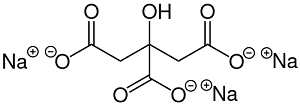Pharmaceutical & Fine Chemicals
Sodium Citrate

Product Description
Sodium citrate, also known as trisodium citrate or sodium citrate tribasic, is a sodium salt of citric acid with various industrial applications.
Product:
Sodium Citrate
CAS:
68-04-2
Synonym:
Trisodium citrate; Sodium citrate tribasic; Citric acid trisodium salt dihydrate; Trisodium citrate dihydrate
Structure:

Typical Characteristics
Appearance
White crystalline powder
Density
1.7 g/cm3
Melting point
>300 °C
Molecular Weight
258.07
Odor
Odorless
Purity
≥99%
Uses, Applications & Markets
Key applications
get a quote
We Offer Sodium Citrate
in various grades
A few of the grades available are listed below:



Sodium Citrate used in many
industry applications
Sodium citrate, also known as trisodium citrate or sodium citrate tribasic, is a sodium salt of citric acid with various industrial applications. Here are some of its main uses:
- Food and Beverage Industry: Sodium citrate is widely used as a food additive and preservative in the food and beverage industry. It serves multiple functions, including acidity regulator, flavor enhancer, emulsifier, and sequestrant. It is commonly added to processed cheese, carbonated beverages, jams, jellies, sauces, and canned fruits to adjust pH, improve texture, and extend shelf life.
- Pharmaceuticals: In the pharmaceutical industry, sodium citrate is utilized as an excipient in the formulation of various oral and injectable medications. It serves as a buffering agent, stabilizer, and chelating agent in liquid and solid dosage forms, contributing to the stability, solubility, and bioavailability of active pharmaceutical ingredients. Sodium citrate is also used as an anticoagulant in blood collection tubes and as a urinary alkalinizing agent in the treatment of urinary tract infections.
- Cosmetics and Personal Care Products: Sodium citrate is added to cosmetics and personal care products for its buffering, chelating, and emulsifying properties. It is commonly found in skincare products, such as creams, lotions, and exfoliating scrubs, where it helps adjust pH, enhance stability, and improve texture. Sodium citrate may also be used in hair care products, such as shampoos and conditioners, to adjust pH and improve formulation performance.
- Medical Diagnostics: Sodium citrate is used in medical diagnostics as an anticoagulant additive in blood collection tubes for plasma or serum separation. It helps prevent blood clotting by chelating calcium ions, allowing accurate analysis of blood chemistry and hematological parameters. Sodium citrate is also employed as a stabilizing agent in urine collection containers to preserve sample integrity during transport and storage.
- Water Treatment: Sodium citrate is sometimes used in water treatment applications as a chelating agent and pH regulator. It can help prevent the precipitation of metal ions and scale formation in industrial water systems by sequestering hardness ions and adjusting pH levels. Sodium citrate may be added to boiler water, cooling water, and wastewater streams to improve water quality and reduce corrosion and fouling.
- Textile Industry: Sodium citrate finds applications in the textile industry as a dyeing assistant and color fixative. It can improve the dye uptake, color fastness, and uniformity of textile dyes on natural and synthetic fibers. Sodium citrate may be used in textile dye baths or finishing treatments to enhance the color brightness and washfastness of dyed fabrics.
- Industrial Cleaning: Sodium citrate is utilized in industrial cleaning formulations as a chelating agent and builder. It can sequester metal ions and soften water hardness, enhancing the effectiveness of detergents and reducing scale buildup on surfaces. Sodium citrate-based cleaners are commonly used in household, institutional, and industrial settings for dishwashing, laundry, and surface cleaning applications.
- Photography: Sodium citrate has historical applications in photography as a component of developer solutions. It serves as a buffering agent and restrainer in photographic developing processes, helping control pH and reaction rates during film or paper development. Sodium citrate may also be used as a component of stop bath solutions to neutralize alkaline developer residues and halt development reactions.
- Metal Plating: Sodium citrate is sometimes employed in metal plating processes as a complexing agent and pH buffer. It can help stabilize plating baths, prevent metal ion precipitation, and improve the uniformity of metal deposits on substrates. Sodium citrate-based electrolytes may be used in electroplating and electroless plating applications for decorative, functional, or corrosion-resistant coatings.
- Biotechnology: Sodium citrate is used in various biotechnological applications, including cell culture media, protein purification, and nucleic acid isolation. It can serve as a buffering agent, chelating agent, and osmotic regulator in cell culture systems, helping maintain optimal pH and ion balance for cell growth and viability. Sodium citrate may also be used in molecular biology techniques, such as DNA extraction and gel electrophoresis.